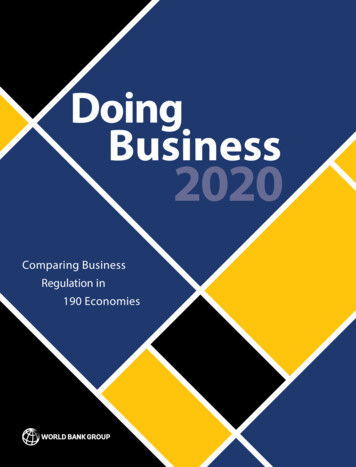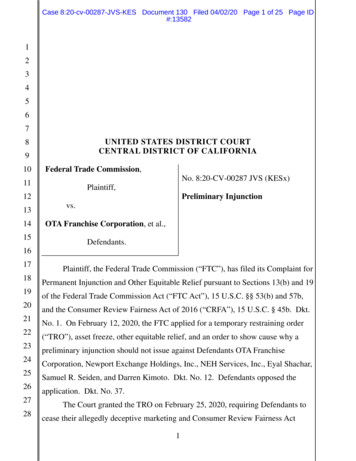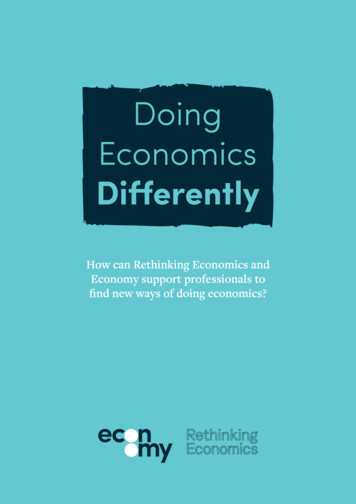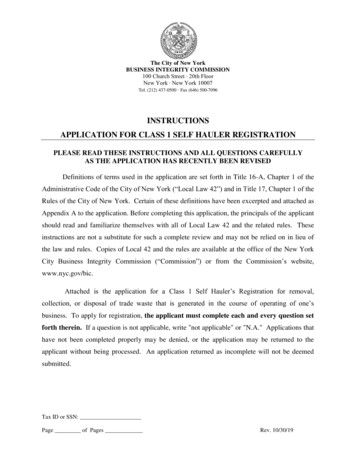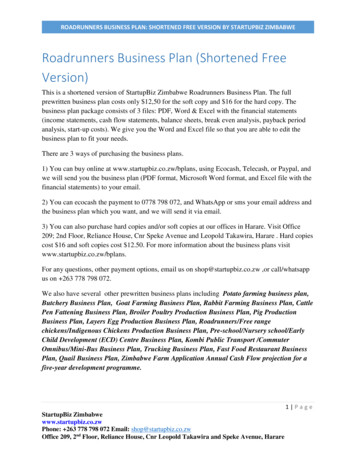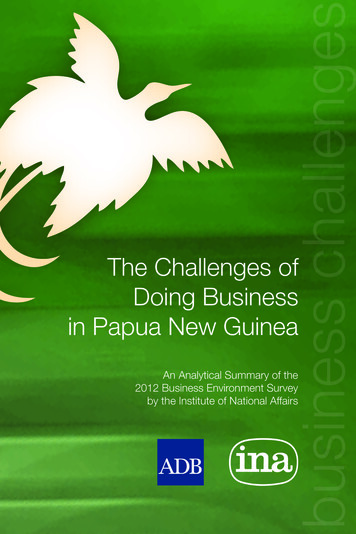
Transcription
business challengesThe Challenges ofDoing Businessin Papua New GuineaAn Analytical Summary of the2012 Business Environment Surveyby the Institute of National Affairs
iiThe Challenges of Doing Business in Papua New Guinea
The Challenges ofDoing Businessin Papua New GuineaAn Analytical Summary of the2012 Business Environment Surveyby the Institute of National Affairs
2014 Asian Development BankAll rights reserved. Published in 2014.Printed in the Philippines.ISBN 978-92-9254-434-8 (Print), 978-92-9254-435-5 (PDF)Publication Stock No. RPT146329-3Cataloging-In-Publication DataAsian Development Bank.The challenges of doing business in Papua New Guinea: an analytical summary of the 2012 businessEnvironment Survey by the Institute of National Affairs. Mandaluyong City, Philippines: Asian Development Bank,2014.1. Economic growth.2. Private sector development. 3. Papua New Guinea. I. Asian Development Bank.The views expressed in this publication are those of the authors and do not necessarily reflect the views andpolicies of the Asian Development bank (ADB) or its Board of Governors or the governments they represent.ADB does not guarantee the accuracy of the data included in this publication and accepts no responsibility forany consequence of their use.By making any designation of or reference to a particular territory or geographic area, or by using the term“country” in this document, ADB does not intend to make any judgments as to the legal or other status of anyterritory or area.ADB encourages printing or copying information exclusively for personal and noncommercial use with properacknowledgement of ADB. Users are restricted from reselling, redistributing, or creating derivative works forcommercial purposes without the express, written consent of ADB.Note:In this publication, “ ” refers to US dollars.Asian Development Bank6 ADB Avenue, Mandaluyong City1550 Metro Manila, PhilippinesTel 63 2 632 4444Fax 63 2 632 2444www.adb.orgFor orders, please contact:Public Information CenterFax 63 2 636 2584adbpub@adb.orgPacific Liaison and Coordination OfficeLevel 20, 45 Clarence StreetSydney, NSW 2000, AustraliaTel 61 2 8270 9444Fax 61 2 8270 9445www.adb.org/plco/psdiPapua New Guinea Institute ofNational AffairsPO Box 1530, Port MoresbyNational Capital DistrictPapua New Guineawww.inapng.comThis report was written by Paul Holden and David Freedman, under thesupervision of Andrea Iffland and Hayden Everett of the Asian DevelopmentBank (ADB) Pacific Liaison and Coordination Office in Sydney, Australia.Samantha-Jane Odbert was the managing editor. This report wasproduced by the Pacific Private Sector Development Initiative, a regionaltechnical assistance facility co-financed by Australian Aid, the New ZealandAid Programme, and ADB.
iiiContentsList of Figures ivAcronyms vOverview 1Introduction 1Structure and Composition of the 2012 Survey 1Constraints Identified in Previous Surveys 2Summary of Key Findings 3Key Policy Recommendations 3Background 5Analysis of the Business Environment —2012, 2007, and 2002 7Political Uncertainty 7Business Security, Crime, and the Courts 9Government Regulations and Policies 12Government–Business Relationships 16Infrastructure and Public Services 19Supporting Institutions 21Constraints to Business and Investment 22Going Forward 25
ivList of FiguresFigure 1: Top reform priorities 4Figure 2: Levels of concern about political stability 8Figure 3: Impact of political uncertainty on business 8Figure 4: Impact of law and order problems on business and investment 9Figure 5: Crimes affecting business 10Figure 6: Business confidence in law enforcing bodies 11Figure 7: Confidence in the judicial system and courts 11Figure 8: Concern for stability of rules, regulations, and policies 12Figure 9: Concern for retrospective changes to rules and regulations 13Figure 10: Business confidence in full implementation of policy announcements 14Figure 11: Impact rating of government controls on a 6-point scale 15Figure 12: Reasons for deciding not to proceed with a major investment 15Figure 13: Business perception of government 16Figure 14: Impact of government corruption on business 17Figure 15: Perceived prevalence of irregular payments to officials 18Figure 16: Areas of government in which businesses experience corruption 19Figure 17: Business rating of specific government services 20Figure 18: Business rating of government services 21Figure 19: Rating of constraints to business and investment 22
vAcronymsADBAsian Development BankCIMCConsultative Implementation and Monitoring CouncilKPapua New Guinean kinaLNGliquid natural gasOLIPPACOrganic Law on the Integrity of Political Parties and CandidatesPNGPapua New GuineaPPPpublic–private partnershipPSDIPrivate Sector Development Initiative
viThe Challenges of Doing Business in Papua New Guinea
1OverviewIntroductionThis report summarizes key results from a business survey in Papua NewGuinea (PNG) in 2012.1 It provides insights and suggestions for policy makers,and acts as a resource for anyone interested in PNG’s development.Comparative analysis using data from similar surveys in 2002 and 2007offers insights into changes in the business environment since 2002. Thesecomparisons highlight the impact of the 2011 constitutional crisis, and theacceleration of economic growth since 2007.The business environment has improved since 2002, but doing businessin PNG remains extremely challenging. Efforts to improve the businessenvironment will help create a foundation for sustained, inclusive, anddiversified economic growth, which builds on that generated by theresource boom.Structure and Composition of the 2012 SurveyThe May–December 2012 survey concerns 130 firms that responded to70 questions on the following themes: impact of political uncertainty;effect of government regulations and policies;cost of crime and security;government–business relationships;effectiveness of government services; andconstraints to business and investment.Nearly two-thirds of participating businesses were PNG-owned, while onethird were foreign-owned, and a few were jointly owned. The majority ofbusinesses were formally registered, and 89% had been in business formore than 5 years. More than 40% operated outside the main commercialcenters of Port Moresby and Lae, and approximately 20% exported productsor services.1Institute of National Affairs. 2013. The Business and Investment Environment in Papua New Guinea in 2012: PrivateSector Perspective—A Private Sector Survey. Port Moresby.
2The Challenges of Doing Business in Papua New GuineaThe sample included businesses of all sizes. Approximately half had an annualturnover of less than K5 million, and could be classified as small and mediumenterprises. The remainder was larger businesses, including multinationals.Surveyed businesses were drawn from 10 industry groups: agriculture;forestry and fisheries;building and construction;finance and investment;hotel, restaurants, and bars;manufacturing;mining and petroleum;retail and wholesale;transport and communications; andother services (e.g., utilities, gaming, personal services, etc.).Comparisons with the 2002 and 2007 surveys’ data have been included totrack changes in the business environment. Although the sample compositionand volume varied slightly, the design and methodology was consistent and thecomposition group sufficiently representative to ensure comparability across thethree surveys.Constraints Identified in Previous SurveysThe 2002 and 2007 PNG surveys and the Asian Development Bank’s (ADB)private sector assessments identified the following main constraints to doingbusiness: political uncertainty;law and order problems;instability of laws, rules, and regulations;poor relationships with Government;corruption; andpoor quality and availability of infrastructure.The previous analyses also identified exchange rate variability, inflation,skilled labor shortages, and local government inefficiencies as additionalconstraints to doing business. Despite some improvement in the businessenvironment between 2002 and 2007, these problems continued to affectmost businesses.
OverviewSummary of Key FindingsWhile the business environment improved in the decade following 2002, doingbusiness in PNG remained extremely challenging in 2012. The most importantissues identified in the 2012 survey were: Business security: law and order was the most pressing issue forbusinesses and their highest reform priority. Confidence in lawenforcement agencies and the judiciary was low. Most businesses hadbeen victims of crime and employed private security guards and othermeasures to protect themselves. Crime, and the measures to prevent it,contributes significantly to business costs. Government–business relationships: most businesses found thegovernment unhelpful. Irregular payments to government officials appearto have become more common, and corruption was rated as the secondhighest reform priority. Infrastructure and services: The poor quality of infrastructure fortransportation and electricity was a critical concern in 2012. Whiletelecommunications had improved since Digicel’s entry in 2007, accessand affordability were still problems. Government regulations and policies: Burdensome and complexregulations continued to discourage investment. Most businesses sufferedunder sudden changes in regulations and policies. Political uncertainty: Businesses were still highly impacted by politicaluncertainty, despite fewer changes in government. Supporting institutions: Businesses had reasonable confidence in keyinstitutions like the Company Registrar and the Securities Commission.They were more confident in private bodies regulating professions such aslaw and engineering, and were highly confident in the financial sector. Constraints to business and investment: Law and order, corruption, andpoor infrastructure constrained business and investment the most.Key Policy RecommendationsThe most important policy recommendations arising from the 2012 survey are: Ensure adequate resources to improve key agencies’ capacities in the lawand justice sector, including the police, correctional services, and judiciary. Increase efforts to tackle corruption through reforms to public procurementand land administration, and reinforce existing controls and safeguards.3
4The Challenges of Doing Business in Papua New Guinea Strengthen existing mechanisms for public–private dialogue, and consultwith the private sector to ensure that policies and legal changes impactingbusiness are developed. Implement a legal framework to promote greater use of public–privatepartnerships to deliver infrastructure and services. Restructure state-owned enterprises to allow greater private sectorparticipation and competition in the electricity, transport, andtelecommunications sectors. Simplify and streamline licensing, business regulations, and taxation toreduce compliance costs and approval times. Review the land-leasing framework to make more land available forbusiness investment and expansion.Figure 1: Top reform priorities30.0% of respondents25.020.015.010.05.0StatLaewAcSt of tana t racede o nsssf e po Co ordetolec rt i rru rQu Po lantri nfr ptiali lit d acit as onty ica nytran l u d ld a nc an Co infra uctudcc ert co mp str rees ain m an ucs t ty pe y turtLo Ina o fin and nsa ax r eca de an st tio atel le qu cia ab n cve at l/b ilit lail g e s an y o msov ub ki f rer si ng ulenm d y s sPoen /ta ervlict t riff iceycax s sones upstran porain Vardr tts iabul(In leve ex Inf esWo stm cha lationnr eAv kers nt, T ge railra atehab ea deStatilit lth , eeoy o co tc.ftf s nd )elekil iticole onCCmos os d laVamlue Ac un t o t o boAd ces ica f sk f in rde s t tio ille pud T o b n i d tsax us nfra lab/G ine st oroo ss rudsSmi can nfor turealldS maner atiods Cc os In vic nAc atte t of ter es Tce red un est axsssrto dom kille atesint es der tic labnaotio mar rna kel m tsarkets0.01st prioritySource: Institute of National Affairs.2nd priority3rd priority
5BackgroundIn PNG, macroeconomic stability, growth, and the passage of the OrganicLaw on the Integrity of Political Parties and Candidates (OLIPPAC) in 2001have all contributed to greater political stability. A coalition led by Sir MichaelSomare and the National Alliance Party was formed following the 2002election, and was the first government since independence to complete a full5-year term. The National Alliance appeared to benefit from the introductionof limited preferential voting in the 2007 election, and Sir Michael formeda successor government that looked likely to complete a second full term.However, Sir Michael’s illness and absence from Parliament in 2011 led to theformation of a new government under controversial circumstances, with PeterO’Neill as Prime Minister.The ensuing constitutional crisis led to political uncertainty that continueduntil the June 2012 national elections. However, this uncertainty had littleshort-term impact on the economy, as commodity prices remained high anddevelopment of the 19 billion PNG liquid natural gas (LNG) gas project wasuninterrupted.The O’Neill–Dion government has committed to growing the private sectorand fighting corruption. It has increased public expenditure on infrastructure,law and order, land reform, and education. While the government’s resourceallocations and policy priorities align with businesses’ priorities, recentchanges to business policy could exacerbate some of the issues the 2012survey identified.Key changes in 2013 included a change in the shareholding of the Ok TediMine, a major amendment to the Takeover Code, and a government decisionto establish a foreign investment review board. The government alsocommitted to restricting foreign investment by reserving certain businessesfor Papua New Guineans. These changes are likely to discourage foreigninvestment and may ultimately reduce the rate of growth and job creation.The amendment to the takeover code is an example of the kind of suddenand unexpected policy change that businesses are concerned about. Theamendment added a discretionary ‘national interest’ test to the reviewprocess for proposed takeovers. It appears to have been designed to block amajor Malaysian producer from acquiring PNG’s largest palm oil producer, butwill now apply to all businesses that are subject to the code.
6The Challenges of Doing Business in Papua New GuineaMany new and existing businesses could be affected, but the government didnot formally consult with the private sector or communicate the amendments’intent and implications. Changes like these create a worrying precedent and,in the absence of consultation on policy and implementation, it is natural forbusinesses and investors to become more cautious.
7Analysis of the Business Environment—2012, 2007, and 2002Political UncertaintyWhen the normal risks of doing business are compounded by politicalrisks, investors demand higher returns and shorter payback periods. Manyproductive investments that would be made in a more stable environmentare not made. This can reduce growth and discourage innovation. Further,experience suggests that investors have long memories and tend to respondcautiously to improved political environments.Most businesses surveyed in 2012 were concerned about political stability(Figure 2), with two-thirds either ‘highly concerned’ or ‘very highly concerned’.However, comparison with 2002 and 2007 responses shows that theproportion of businesses that were ‘very highly concerned’ fell significantly.This could be attributed to the trend towards more stable ruling coalitions,although frequent changes in the key ministerial positions in a coalition canalso be perceived as a source of political instability.Political uncertainty directly impacts business (Figure 3). In 2012, nearly 70%of the businesses reported that they were affected by political uncertainty.However, comparison with previous surveys shows a clear reduction inbusinesses that were ‘highly’ or ‘very highly’ affected. This can be attributedto the stability of the political environment between 2002 and 2011, and therelatively small impact of the subsequent constitutional crisis on the economy.The collective responses show that political stability remains a majorconcern for businesses in PNG. This shows that attitudes towards risk arenot symmetrical, and that it is often easier to destroy rather than restoreconfidence.
8The Challenges of Doing Business in Papua New GuineaFigure 2: Levels of concern about political stability70.060.0% of respodents50.040.030.020.010.00.0Very oncernedNo response2002Source: Institute of National Affairs.Figure 3: Impact of political uncertainty on business40.035.030.0% of respondents25.020.015.010.05.00.0Very ce: Institute of National mpletelyunaffectedNo response
Analysis of the Business Environment—2012, 2007, and 2002Business Security, Crime, and the CourtsIn 2012, law and order was again ranked as the most pressing concern forbusiness and the top priority for government action. If the legal code and lawenforcement institutions cannot ensure public safety, it becomes harder to dobusiness and investment becomes more risky. Security is a key public goodthat the State needs to supply. Businesses can act to protect themselves fromcrime, but this can never fully replace the State providing a legal code, policing,and enforcement.Approximately 80% of respondents reported that law and order problemshave influenced their business and investment decisions (Figure 4). Thereduction in the proportion of businesses that were ‘highly’ or ‘very highly’affected by crime is encouraging, although the total proportion affectedrose in 2012. The reduction in the ‘highly’ and ‘very highly’ categories mayalso be associated with more favorable investment conditions created byPNG’s recent high growth and, possibly, improvements in businesses’ riskmanagement.Businesses surveyed in 2012 listed a wide range of crimes affecting theiroperations (Figure 5). The impact of the unsafe environment extends farbeyond the direct cost of these crimes. Expenses increase when businessesFigure 4: Impact of law and order problems on business and investment50.045.040.0% of respondents35.030.025.020.015.010.05.00.0Very ce: Institute of National mpletelyunaffectedNo response9
The Challenges of Doing Business in Papua New GuineaFigure 5: Crimes affecting business80.070.060.0% of .0Pe10Source: Institute of National Affairs.have to protect their staff and property, insurance is more costly, and itbecomes harder to recruit specialist international staff. Security problems canalso impact productivity, as businesses adjust working patterns and reduceoperating hours to lower their risks.Confidence in law enforcement bodies is low (Figure 6). Fewer than 10% ofthe companies surveyed in 2012 were either ‘highly’ or ‘very confident’ in lawenforcement, and the majority of businesses indicated a lack of confidence.Similarly, confidence in the judicial system was low. In 2012, only 50%expressed a conviction that the judicial system would prosecute law breakersand enforce contracts fairly (Figure 7).There was a dramatic decline in confidence in law enforcement bodies andthe judicial system. In 2002, 44% of businesses were either ‘highly’ or ‘veryhighly’ confident in the judicial system; this dropped to 18% in 2007, andfell to 14% in 2012. This decline is serious, given the judicial system’s crucialrole in the criminal justice system and in enforcing contracts. This is anotherarea of public goods provision that the business community in PNG views asinadequate.
Analysis of the Business Environment—2012, 2007, and 2002Figure 6: Business confidence in law enforcing bodies40.035.0% of respondents30.025.020.015.010.05.00.0Very y notconfidentHighly notconfidentCompletelynot confidentNo responseSource: Institute of National Affairs.Figure 7: Confidence in the judicial system and courts50.045.040.0% of respondents35.030.025.020.015.010.05.00.0Very ource: Institute of National Affairs.Fairly notconfident20072002Highly notconfidentCompletelynot confidentNo response11
12The Challenges of Doing Business in Papua New GuineaGovernment Regulations and PoliciesThe quality of economic, legal, and social institutions is a key determinant oflong run growth.2 The government supports these institutions’ mandates byshaping formal policy, rules, and regulations. These ‘rules’ determine the easeof operating a business in the formal sector. Complicated, burdensome rulesincrease compliance costs, encourage informality, and block new investment.Investment is encouraged by a stable set of supportive rules, regulations,and policies. Unfortunately, the businesses surveyed were concerned aboutthe stability of these factors (Figure 8) and, in 2012, over half identifiedstability as either a ‘very high’, or ‘high’ concern. If the ‘fairly concerned’group is included, then over 85% were concerned about the stability of rules,regulations, and policies. Despite improvement since 2002 and 2007, thisrate remained alarmingly high in 2012.This is important, because sudden changes in rules and regulationsimpose adjustment costs on business and can even result in profitablebusinesses closing down. When considering new investments, businessesFigure 8: Concern for stability of rules, regulations, and policies45.040.035.0% of respondents30.025.020.015.010.05.00.0Very airlyHighlyCompletelyunconcerned unconcerned unconcerned2007No response2002Source: Institute of National Affairs.2Rodrick, Dani. 2000. Institutions for High Quality Growth: What They are and How to Acquire Them, National Bureau ofEconomic Research Working Paper 7540. February.
Analysis of the Business Environment—2012, 2007, and 2002and entrepreneurs analyze the expected investment return. When rules andregulations are unstable, the possibility of unexpected changes increases therisks. This discourages investment and business formation.Changes to policies, rules, and regulations can be applied on a forward orbackward basis. Retrospective changes can be particularly damaging, sinceinvestors are often unable to anticipate them when first investing to developthe business. As a result, retrospective changes can seriously underminebusiness and investor confidence and reduce total investment.3The proportion of respondents concerned about retrospective changes hasincreased since 2007, and was over 80% in 2012 (Figure 9). This is worryinglyhigh. Two-thirds of businesses indicated that when changes in governmentoccurred, they expected major policy changes that damage their business.At the same time, very few businesses expressed confidence in the fullimplementation of new policy announcements, with only 11% ‘always’ or‘mostly’ confident (Figure 10). Despite some improvement between 2002 and2012, concerns about the continuity of policy and the implementation of newinitiatives remain high.Figure 9: Concern for retrospective changes to rules and regulations40.035.030.0% of respondents25.020.015.010.05.00.0Very airlyHighlyCompletely No responseunconcerned unconcerned unconcerned20072002Source: Institute of National Affairs.3Examples include the introduction and repeal of amendments to the Environment Act 2000 (the Environment (Amendment)Act 2010), and ongoing discussion about proposed amendments to the Mining Act 1992, which would change how miningcompanies operate by shifting mineral ownership from the State to local landowners.13
The Challenges of Doing Business in Papua New GuineaFigure 10: Business confidence in full implementation of policy announcements35.030.025.0% of ldomconfidentNeverconfidentNo responseSource: Institute of National Affairs.A more detailed question on the impact of government regulationssuggests that the process for arranging work permits and visas for foreignworkers continued as problematic in 2012. More encouragingly, Figure 11reveals fewer problems caused by restrictions on foreigners’ occupations,superannuation regulations, and foreign currency regulations. Improvementsin superannuation regulations and foreign currency controls can be tracedto legislative reforms in 2000, and demonstrate the potential benefits ofconcerted reform.Notwithstanding small improvements since 2007, difficulty in complying withgovernment regulations continues to deter investment. In 2012, 30% of totalbusinesses reported that they had cancelled planned investments due tocompliance problems. The complexity of rules and regulations and the timeneeded for administrative processes were two of the most commonly citedproblems. Complex regulations highly burden businesses with annual turnoverbelow K5 million, million, with 38% (18% ‘excessive compliance fees,’ and 20%‘too complex and haphazard’) reporting that they had cancelled investmentplans because of compliance-related problems (Figure 12).
15Analysis of the Business Environment—2012, 2007, and 20025.04.03.02.01.020072002Source: Institute of National Affairs.Figure 12: Reasons for deciding not to proceed with a major investmentNoresponseOther13%5%Excessivecompliance fees18%Too complexand haphazard20%Long processing time44%Source: Institute of National Affairs.aseslsGovernment rforulaeigrmitspeVisaWorkupccnoionsons0.0s6-point scale: "not a problem" (1) "extremely problematic" (6)Figure 11: Impact rating of government controls on a 6-point scale6.0
16The Challenges of Doing Business in Papua New GuineaGovernment–Business RelationshipsCollaborative relationships between government and the private sector are animportant feature of a well-functioning business environment. Dialogue andconsultation build trust, and ensure that businesses have an input into newpolicies that will affect their operations. Other features of good relationshipsinclude businesses’ willingness to engage with government, comply with lawsand regulations, and refrain from seeking special treatment.Since 2007, progress with improving government–business relationshipshas been mixed. The National Working Group on Removing Impediments toBusiness and Investment was established as a high-level forum for public–private dialogue, but ceased operation in 2009. It was reinstated in late 2011,and now meets regularly. The Consultative Implementation and MonitoringCouncil (CIMC) provides another forum for structured public–private dialogue.Private sector representative bodies also engage with the government throughother channels.However, efforts to improve public–private dialogue did not translate intoimproved government–business relations in 2012 (Figure 13). ApproximatelyFigure 13: Business perception of government35.030.0% of respondents25.020.015.010.05.00.0Very highlyhelpfulHighlyhelpfulFairlyhelpful2012Source: Institute of National Affairs.Fairlyunhelpful2007Highlyunhelpful2002Very highlyunhelpfulNo response
Analysis of the Business Environment—2012, 2007, and 200240% of respondents in 2012 described bureaucratic and governmentrelationships as ‘highly unhelpful’ or ‘very highly unhelpful’. Very similar resultswere found in 2002 and 2007, suggesting little or no improvement.Questions about consultation during policy development offer further insightinto weak government–business relationships. While 83% of surveyedbusinesses believed that they should ‘frequently’, ‘mostly’, or ‘always’ beconsulted during the development of new policies or regulations, more thanhalf were unaware of public–private consultations.Efforts to strengthen the government–business relationship can also beundermined by corruption. A predatory attitude towards business by politiciansor bureaucrats fosters cynicism in the private sector and, in the long run,reduces investment.Corruption is a serious issue for businesses in PNG with 57% of respondentsin 2012 reporting that they had been ‘fairly’, ‘highly’, or ‘very highly’ affectedby instances of government corruption (Figure 14).Figure 14: Impact of government corruption on business30.0% of respondents25.020.015.010.05.00.0Very ce: Institute of National mpletelyunaffectedNo response17
18The Challenges of Doing Business in Papua New GuineaThe proportion reporting that it was ‘mostly’ or ‘always’ common forcompanies in their sector to make ‘irregular additional payments’ togovernment officials increased from 17% in 2002 to 30% in 2012. Thissuggests that low-level corruption became more common (Figure 15).However, the benefit of making ‘irregular payments’ is limited; only 30%of businesses reported actual service delivery without further demands forpayments. Businesses also have little recourse when government officialsdemand irregular payments. In 2012, 22% reported never seeking recourse,and only 14% reported that
While the business environment improved in the decade following 2002, doing business in PNG remained extremely challenging in 2012. The most important issues identified in the 2012 survey were: Business security: law and order was the most pressing issue for businesses and their highest re

